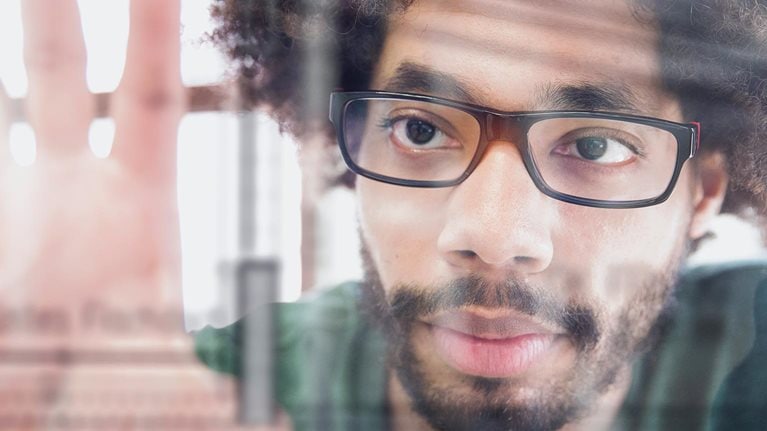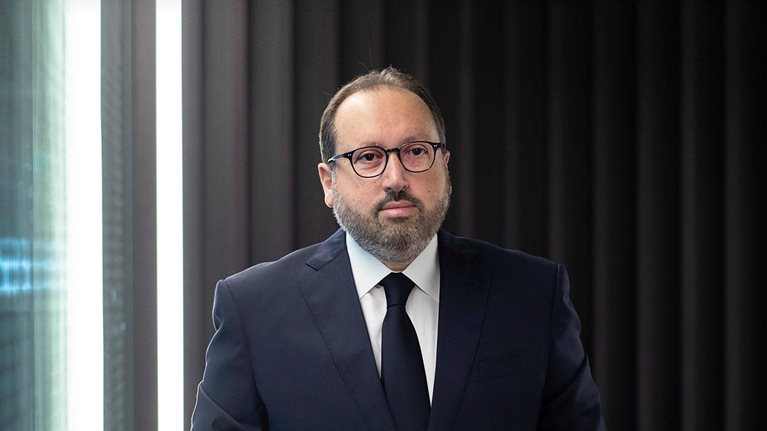Nearly 830 meters high, reaching just over half a mile, soar the 163 stories of the Burj Khalifa. Thirty times higher stacks the amount of paper that Dubai saves each year from its “Dubai Paperless Strategy”—the happy externality of making its government almost completely digital. But then, as Wesam Lootah, CEO of the Smart Dubai Government Establishment explains, happy is exactly the point. Since its establishment in 2015 by His Highness Sheikh Mohammed bin Rashid Al Maktoum, Vice President and Prime Minister of the UAE, Ruler of Dubai, Smart Dubai has been charged with the mission of unleashing digital transformation to make Dubai the “happiest city on earth.”
That’s a tall order, especially when one considers the dread that residents of any city worldwide typically feel when they confront their government bureaucracies and navigate reams of technical (and sometimes, apparently, conflicting) regulations. But it works in Dubai. Delivering on an impressive array of innovations for residents, visitors, and businesses, Lootah and his team have created or facilitated seamless, user-friendly applications such as DubaiNow (a single app for well over 130 government services—essentially, all of City Hall, and more, at a swipe), Invest In Dubai (a new web portal for business owners, managers, entrepreneurs, and investors to start their business in Dubai within minutes), and UAE PASS (the secure national digital-identity and digital-signature solution for the UAE), not to mention the skyline’s-worth of paper saved.
In March, Lootah spoke with McKinsey’s Abdulkader Lamaa about the Smart Dubai story, what new innovations are in store, and how a constant focus on the human element is turning digital transformation into a competitive advantage.
McKinsey: Describe the Smart Dubai story—and your own.
Wesam Lootah: Smart Dubai is the entity that’s in charge of digital transformation across the city. It’s a story of evolution, with many important milestones of collaboration and partnership, and the extraordinary vision and leadership of H.H. Sheikh Mohammed bin Rashid Al Maktoum. Dubai has always been a city that has relentlessly sought progress. Our digital transformation journey, which actually preceded Smart Dubai, started more than two decades ago with the formation of “eGovernment,” which is now part of the Smart Dubai agenda.
But it’s important to stress that technology is just a means to an end. Our objective has always been to ensure people’s happiness and well-being. We do that by tailoring advanced technologies into better services for individuals and businesses. Yes, there has been a digital transformation. But our priority is really on the transformation of the citizens’ and residents’ experience with the government and within the city. We aspire to utilize technology not for its own sake, but to increase the efficiency of the government through best-in-class implementation of process automation, service integration, and shared services. For example, more than two decades ago, we laid the foundation for the government-information network which we now call the Government Resource Planning System [GRPS], a set of systems that is the back office of the entire government. Over 70,000 employees benefit from this system, whether it is in human resources, procurement, inventory, or financial planning, across more than 70 government entities. Having such shared services not only saved billions of dollars for the government, it has also helped government entities focus on their core missions.
As for myself, I joined the government about 20 years ago. Nearly two-thirds of my career has been in the public sector, specifically in the interaction between technology and government services. I’m blessed, as my role combines my two passions: public service and technology.
McKinsey: The role certainly requires both.
Wesam Lootah: It does—you need to have a solid understanding of technology and engineering principles and capabilities. But that’s not enough. The secret sauce is leadership and vision—H.H. Sheikh Mohammed bin Rashid Al Maktoum’s. It’s a lesson that applies very clearly in the private sector. Think of companies like Apple or Amazon: they each have a visionary CEO and a world-class leadership team. That applies not just for embracing innovation, but also for setting the aspiration. Ours is very clear: to make Dubai the happiest city on earth. This has to be made practicable across multiple government entities, and H.H. Sheikh Maktoum bin Mohammed bin Rashid Al Maktoum, Deputy Ruler of Dubai, personally delivered that message to the team: break down barriers, work together, partner, get to a single platform to service the city. The citizens and residents are the customer.
McKinsey: How do you think about what the customer needs?
Wesam Lootah: By approaching solutions from a customer perspective. What is the user experience? What does it feel like? The DubaiNow app works with a single touch, click, or swipe to get things done, whether you’re paying for parking, or your electricity bill, or phone bill, or even selling your home—with many other use cases. Our vision is not fully realized yet—this is a journey—but we’ve crossed one million downloads and have collected over a billion dollars. And we’re happy that we’ve collected amazing feedback about the experience from the app’s users.
It’s the users that we think about, and their full end-to-end journeys, not just the component that’s related to the government. We try to incorporate their actual use cases into the application. For example, if I’m buying a car, I’m not thinking just about registration services; I’m also thinking about insurance and a car loan. We include all of these touch points, and integrate the private sector, within the customer journey. Our aspiration is to provide a seamless end-to-end experience to our people.
Meeting that aspiration requires agility. We’ve built a “digital tribe” and empowered it to work across different product lines. We want teams that are multidisciplinary and, especially, autonomous. They have a clear mandate; they can make decisions and they work closely together to deliver on our customers’ promise. The design team, the engineering team, and the DevOps team—they’ve got to be focused on moving quickly to deliver value to our citizens and residents. I would say, too, that co-location has been critical, and it’s certainly helped that we had launched this before the pandemic. Having a project office where everyone worked closely together helped us a great deal in terms of communication and alignment, particularly with respect to the business, technology, and policymaking aspects.
McKinsey: How do you think about public–private collaboration?
Wesam Lootah: We would not be where we are today in Smart Dubai without our vast network of partners, both from the government and private sector. We partner with telecom companies, software companies, banks—and the list goes on. They span industries, but they share some important points in common with us: They work at speed. They are customer focused. They care about impact. All of that comes together to create a symbiotic relationship.
McKinsey: Speaking of benefits and impact, could you speak about how Paperless Dubai came about?
Wesam Lootah: Around 2016, as we were looking at the impact and the results that we’ve achieved in the government and in the city in terms of digital transformation, we could see various levels of maturity. Some government entities were quite ahead in their services and their digital channels. Some were catching up. But when we looked holistically at how digital systems are helping the citizens and residents conduct their business within the city and in the government, we saw quite a lot of opportunities for improvement.
As a matter of fact, we saw 325 million opportunities for improvement. This is literally the number of sheets of paper that were used by citizens or residents interacting with the government on an annual basis. Three hundred twenty-five million pieces of paper, stacked one on top of the other, is 30 times the height of Burj Khalifa. We’re not at 100 percent paper reduction yet, but we’re about 80 to 82 percent of the way there. And we’ve also announced recently that four government entities are now 100 percent digital. What started as a dream, as a vision—what some people said was impossible, at least in a short time frame —we have now proved is indeed possible.
The paper aspect, though, is just a proxy to the digital transformation. Our purpose is not just to eliminate the use of paper in public service, but to actually transform services—to make them seamless, personalized, impactful, and efficient. Our strategy has three pillars. One is technology: providing the technologies and building on the digital infrastructure that we have within the city to enable things like digital signatures of one’s identity. The second pillar is legislation; technology can move ahead, but if the legal framework and infrastructure are not in place, you can’t achieve your objective. Finally, we have the culture, acceptance, and adoption of our citizens, residents, and the stakeholders. By working across all three aspects, I’m very proud to say that we are now realizing our strategy. We’re going to be saving more than $250 million annually. The money flows back to the citizens and residents, in addition to, of course, the environmental impact from avoiding the printing and use of paper.
McKinsey: Could you speak about another initiative, Invest In Dubai?
Wesam Lootah: Obviously, DubaiNow is a cornerstone digital channel; it will serve 80 to 90 percent of the needs or the competencies of the residents and businesses in Dubai. But there will always be niches where we need a specific digital channel; we recognize that one size does not fit all. Invest In Dubai is for anyone who wishes to start a business in Dubai. Users select their respective industry, get necessary government approvals, set up a bank account, and get a trade license—100 percent digitally. In many cases, you can begin the registration process and start conducting business activity in one day. We wanted a platform to help users save time and effort to connect to government entities and ensure a smooth journey, across all possible business activities that the investor could be interested in. That’s the case whether you’re opening up a grocery shop or a chemical plant; the range of business activities is quite diverse. Being able to bring together all government entities involved in issuing a trade license, connect all of the systems, and digitize the different business rules that come into play is one of the most critical challenges we had.
Think about this from the perspective of the managers and entrepreneurs, what they need to run their businesses efficiently, with all the interactions that entails: employment, acquiring new properties or expanding existing ones, opening new branches, and connecting with other opportunities within the city. And there are a lot more interactions than one might initially imagine, with a list that gets greater when one thinks over the life cycle of a business: delegation or power of attorney, for example, or identifying legal firms and PR roles, authorizing transactions day to day, making a change in your memorandum of association—many of which come into play at the same time. We approach this by figuring out who, on the government end, needs to do what, who needs to approve what, and how we can be dynamic and flexible to support all of the many different scenarios.

Digital public services: How to achieve fast transformation at scale
McKinsey: That’s obviously a technical challenge, too, in terms of laws and regulations. What guides your approach as you think about digitization from this aspect, what some call “rules as code”?
Wesam Lootah: We look at our mission fundamentally. A big part of what government is supposed to do is to provide an environment that protects the citizens, residents, and businesses within the city through regulations and controls. It’s a mistake to approach government services from the perspective of the regulator; one needs to think, again, from the user’s perspective.
So today, for example, I can safely walk into a restaurant, order my meal, and consume it, knowing that there are health and safety regulations—the municipality has inspected this location and ensured that the process of producing this meal was safe. Similarly, if you look across many of the activities within the city, the government plays its regulatory role where we say, “This is the level of protection that we want for our citizens and residents, this is the level of standard that we expect.” These are translated into the eligibility criteria for someone to start a business of any kind, the requirements that they need to comply with and complete before they are issued a license to operate and run their business. We’re not able to hand code every single rule and bake it into the system. We had to come up with a way that abstracts all of these rules into something that’s easily manageable by humans—employees, legislators, and policymakers. So whenever, let’s say, the Department of Health and Safety within the municipality decides that in order for a restaurant to be safe it needs to have at least 250 square feet of space, the system applies a consistent set of rules. It specifies what needs to be done in a human, readable way. And this gets translated into the machine code that then applies the rule in real time. Without doing that, we would not be able to create the 2,000 different variations of rules and regulations that are required to register a company and comply with government requirements. And, by the way, the rules in a city like Dubai are very dynamic. It’s not a one-time job. This is a continuous process that you have to be able to update, improve, and enhance, in a transparent way. We’re now linking the legislation, the actual decrees, and the rules within the system, so at any point in time, somebody can look at the rules and know the systems that will enable it.
McKinsey: How do you think about what comes next, and how important is it that the systems work in an integrated way overall?
Wesam Lootah: Investing in technology is no longer a luxury. It is a necessity to make sure cities are prepared for whatever challenges are ahead. We can confidently say that Dubai’s Smart City infrastructure and investments in technology have proven to be the right decision with regards to the COVID-19 pandemic, which caught some cities and some governments off guard.
A key part of achieving this was our capability for enabling a digital signature, which is supported by our national digital-identity program. The mandate for Smart Dubai is to create enabling technologies or components that will help accelerate the digital transformation of experiences within the city. One of the things that needed to be solved is identity; whenever you interact physically with another partner or another entity, you typically identify yourself through a government-issued identity. That’s not new to digital; people have long used a physical passport or an ID card. But in cyberspace, you need to have an equivalent digital ID that you are able to use across various digital channels. Otherwise, we end up with not tens but hundreds of digital identities. Worse, they don’t talk to one another. Of course, that’s not conducive to digital transformation. So we set out to create one digital identity for every citizen and resident in the UAE. It’s a collaboration between Smart Dubai, the UAE’s Telecommunications and Digital Government Regulatory Authority, and the Abu Dhabi Digital Authority. The three of us came together to create one single digital identity that is based or anchored on the physical ID that everyone gets here in the UAE. We launched this secure national digital identity—UAE PASS—over two years ago, and we’ve crossed one million UAE PASS users. Over 6,000 services are now integrated across the Emirates, including federal and local government entities, and recently, the banking sector has made it possible to use the digital ID for account creation and KYC [Know Your Customer identity verification tool].
McKinsey: With so many competing concerns—for example, environmental, poverty reduction, social issues, employment—how do you prioritize incremental dollars for your technology investments?
Wesam Lootah: We focus on people. We want Dubai to be the happiest city on earth for them—not just the smartest, or the most technologically advanced. The happiest. When you empower individuals, amazing things happen. Just look at the Emirates’ current mission to Mars, where the slogan is “the sky is no longer the limit.”
By empowering individuals, we aspire to uplift and create positive impact on the entire region, particularly the youth within our region. We hope that our experiences become an inspiration for other cities, as well. In the next few decades, cities will increasingly compete for talent and investment. We want to make Dubai the landmark destination for both. And in order to do this, we have to ensure that we are the best place to live, the best place to conduct business, the best place to grow and to learn. Obviously, digital transformation is going to play a pivotal role in expanding the city and scaling it to create these unique experiences. But the focus is on people. Our citizens, residents, and visitors always come first.


